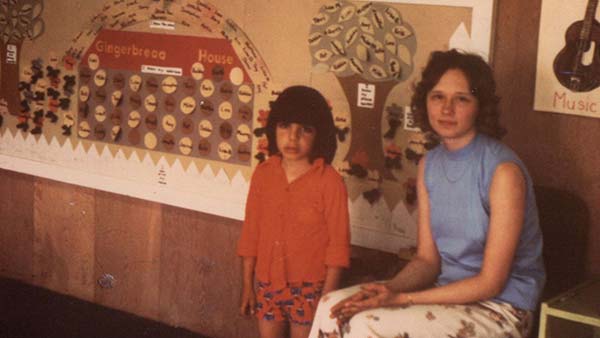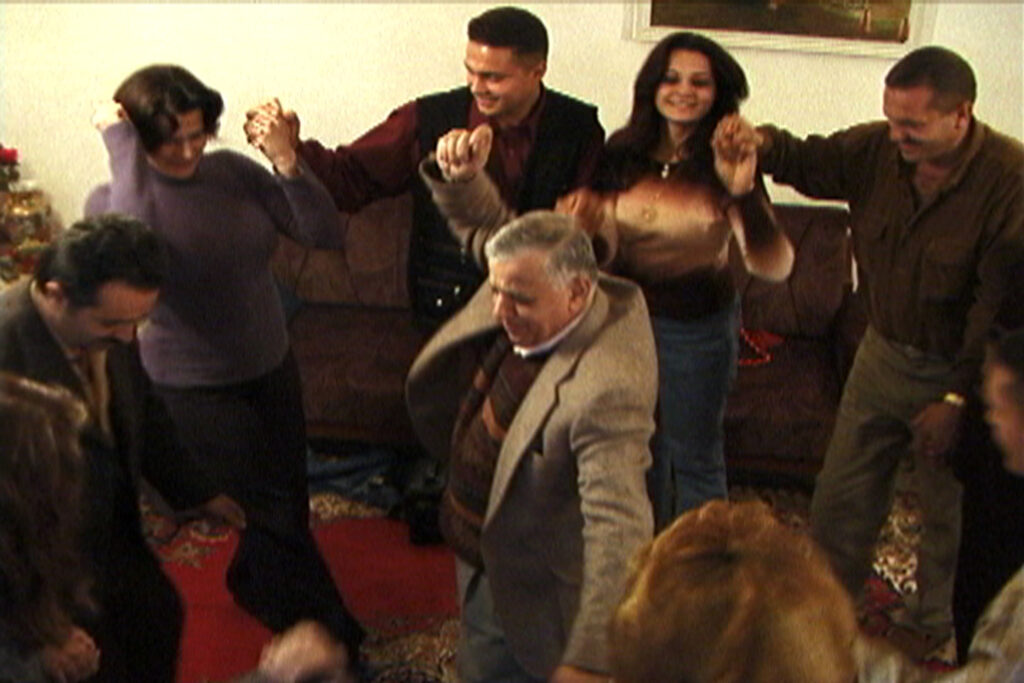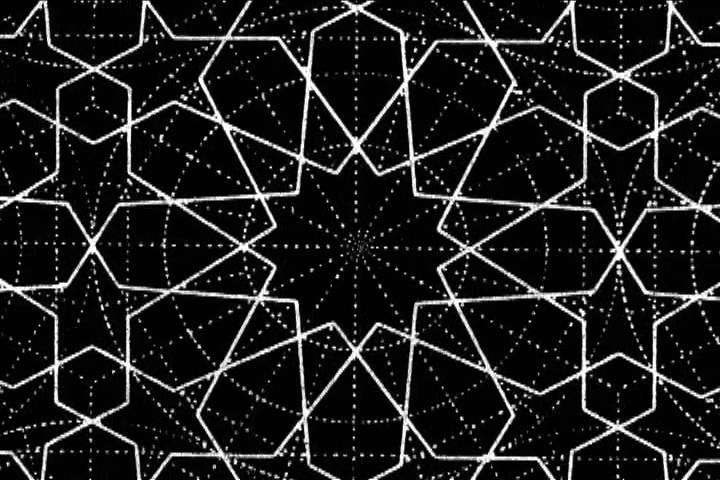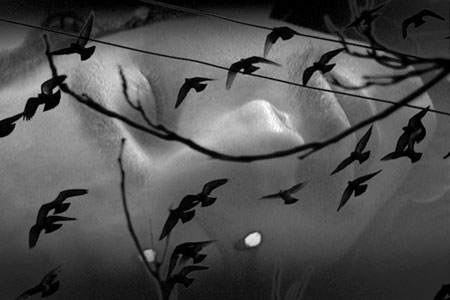Press Archive
American Arab
“It’s giving voice to people who have been marginalized—and when they are presented in mainstream American media, it’s rarely from their perspective… At the same time, the movie doesn’t feel confrontational. It feels like the start of a conversation, rather than a provocation.”— Ben Sachs, Chicago Reader
“Probes what you might call the Arab-American dilemma… Alshaibi’s family is smart and complicated, and you immediately have an emotional connection to these people.”— Nina Metz, Chicago Tribune
“American Arab is a gift, an important document and beacon of hope for a community and people too often misunderstood, with disastrous consequences.”— Ravi Chandra, CAAMFest
“Alshaibi has deep roots in the underground, having made narrative and documentary films that push both thematic and stylistic boundaries. His 2007 film Nice Bombs documents his trip back to Baghdad to see his father shortly after the Iraq War broke out. American Arab picks up this thread of personal narrative and explores what it means to be an Arab-American, post-9/11. Further, in the great tradition of American personal documentary film, Alshaibi also struggles with what it means to be a filmmaker who happens to be Arab-American. Less concerned with aesthetics than ideas, he uses the camera as a tool to dig for answers about identity, art and filmmaking that are often overlooked.”—Michael Galinsky , International Documentary Association, documentary.org

Profane
“This is one of the most heretical and daring visions of sexuality ever filmed, transgressive in a way comparable to how Last Tango in Paris was 40 years ago and Shortbus five years ago. Iraqi-American filmmaker Usama Alshaibi probes the psyche and mileu of Muna, a Muslim dominatrix for whom extreme kink and piety are blended seamlessly into her life. Manal Kara gives what is simply one of the most courageous and sexually penetrating performances ever filmed. It’s on a par with the sexual breakthrough performances of the iconic films of Nagisa Oshima (In the Realm of the Senses, Taboo). Moreover, erotic guilt-driven fantasies of the American soldier comprise an added fascinating layer to this magnificent work. Arguably the best movie ever to be set in Chicago.” – Lavender Magazine
“Like a bargain-basement version of Gaspar Noé’s Enter the Void, this Chicago-shot feature by Usama Alshaibi (Nice Bombs) uses a panoply of shock tactics—rapid editing, blurry superimpositions, drug use, and S-M—to evoke nauseous fascination with the sexual underworld. And like Noé, Alshaibi seems as curious about religious transcendence as degradation. The heroine, a Jordanian immigrant, works contentedly as a dominatrix but wants to reconnect with her Muslim roots; scenes of her lurid career alternate with a sweet subplot in which she befriends a religiously devout Middle Eastern cabdriver. Though certainly not for the squeamish, the movie is a striking story of life in the Arab diaspora, aided rather than undermined by its occasional narrative incoherence.” — Chicago Reader
“Torn between ecstasy and submission, Muna takes an unorthodox path to enlightenment, one that Profane dramatizes with documentary methods and psychedelic imagery. Alshaibi demonstrates that true reverence sometimes requires transgression.” – The Boston Phoenix
“A deeply felt journey into psychosexual horror”-Time Out Boston

Nice Bombs
“Disarmingly casual, seemingly artless “personal diary” docu Nice Bombs makes decidedly sophisticated use of home-movie aesthetics in its exploration of Iraq at the onset of the American Occupation as Baghdad-born, experimental filmmaker Usama Alshaibi, accompanied by his Kansas-bred blond wife and his estranged father, returns to the country and the extended family he hasn’t seen for 24 years. Opening July 11 at Gotham’s Pioneer Two-Boots, thoroughly engaging docu, exec produced by Studs Terkel, inserts snapshots of an unfamiliar country in violent transition within the entirely recognizable context of a normal, if long-delayed visit home.”-Variety, Ronnie Scheib (read more)
“Loaded with candid conversations and opinions about the hot-button issues of war, terrorism, and Islamic extremism, Nice Bombs offers many different Iraqi and American points of view and portrays a time and place of nightmarish complexity.”- New York Sun, Bruce Bennett
“When Studs Terkel urges you to do something, you do it. “He sort of put me on the spot,” recalls Usama Alshaibi, who was working at the Chicago History Museum as a sound engineer when his project sparked Terkel’s interest. It was January 2004 when the legendary author and historian came into Alshaibi’s office and asked about his family in Baghdad. Alshaibi replied, “Well, I have this idea about going to Iraq and interviewing my family….” And that’s what set Terkel off. “He said, ‘You have to go!’ ” Alshaibi says. “He pulled out his checkbook and gave me my first donation.” –Time Out Chicago, Jason Mojica, August 10, 2006
“Alshaibi does something so simple yet, sadly, so neglected: He lets a Western audience see Iraqis not as crazed Middle Easterners shouting and shooting (and dying) en masse, but as individuals going about their daily lives—shopping, listening to the radio, hanging out. Those shared-humanity moments make all the more compelling the postscript phone call, in which Tareef tells Alshaibi that, since his visit, Iraq has gone from tolerably bad to almost irredeemably worse.”—Time Out Chicago, Novid Parsi August 2006
“Chicago filmmaker Usama Alshaibi grew up in Iraq and the U.S., and although he recently became an American citizen, his personal video documentary has plenty to say about the day-to-day existence of his Baghdad relatives, whom he visited in 2004. Distance tends to simplify our view of anything, and this video humanizes the situation on the ground mostly by complicating it: in a voice-over Alshaibi says he’s often asked what “the Iraqis” think, but by the end this question has become as meaningless as asking what “the Americans” think. Much of his previous work has been experimental, but this becomes formally adventurous only near the end, as he converses by phone with a cousin who tells him how much worse the situation has grown this year.”–Critics Choice , Jonathan Rosenbaum, Chicago Reader
“I was born in Iraq,” says Usama Alshaibi, “and was recently sworn in as a citizen of the nation that was now attacking it.” At the start of his documentary, Nice Bombs, it’s March 2003, and Alshaibi is safe in Amsterdam, honeymooning with his new wife Kristie. On TV, protests against the war are loud and numerous, followed by the seemingly unavoidable invasion. Within weeks, when Usama and Kristie are back home in Chicago, the Saddam Hussein statue falls and looting commences. Alshaibi observes, “I had a feeling that the news I read and saw was not telling me the full story.”-by Cynthia Fuchs, PopMatters
“In early 2004 Chicago filmmaker Usama Alshaibi returned to his native Iraq with his wife, producer Kristie Alshaibi, and his camera. He had been away for nearly a quarter-century. The result is a surprisingly warm first-person video diary, blending a series of reunions with Alshaibi’s vast array of relatives and footage of the bazaars, streets, homes and everyday perils of life in post-Saddam, mid-occupation and mid-chaos Iraq.”-Michael Phillips, Chicago Tribune

Allahu Akbar
“…shimmying geometries celebrate the liberation from image making.” -From Aniconism to Bliss: Media art shows its Islamic roots, Pacific Cinematheque, Vancouver, Canada
“In Allahu Akbar, the US based filmmaker Usama Alshaibi has created joyful and playful animations out of the traditional geometric themes of Islamic art. These complex geometries are rendered in simple black and white, and then superimposed and spun around their central axis, in a close rhythmic relationship with the lively soundtrack of traditional and popular Iraqi music. The result is a giddy playfulness, reminiscent of psychedelic Pop Art, and far removed from the contemplative quiet I normally associate with Mosques and the inner courtyards of traditional Arab architecture. The video also recalls the films of Harry Smith. My only complaint is that, for a person like me who really loves this music, I could have watched a much longer film which used at least one complete musical selection!” -Resistence(s) DVD Review by David Finkelstein, Film Threat
“Usama Alshaibi’s Allahu Akbar, whose hypnotic geometrical patterns seem inspired by Islamic art but whose bouncy sound track rebukes ultraorthodox Islam’s prohibition of sensual pleasures, including music.” -Fred Camper, recommended program, Chicago Reader (Nov.21, 2003)
“Alshaibi’s five-minute video animation Allahu Akbar, a mesmeric montage of morphing geometrical patterns from Islamic art, flashed to the beat of Middle Eastern music.” -Ted Shen, Chicago Reader (August 28, 2003)

Muhammad and Jane
“There’s nothing like a good dose of paranoia to feed the senses, according to Chicago filmmaker Usama Alshaibi. His film Muhammad and Jane is a black-and-white tale about an Iraqi-Polish man, Muhammed (Piotr Tokarski), attempting to return to the United States with a few illegal passports under his belt. Once he gets past airport security, albeit in a sweat-induced state, he is increasingly dogged by claustrophobic fear in his quest for a place to stay. He finds it and subsequently meets Jane Doe (Melina Paez), a girl running through the alley and mutually haunted by some unimaginable force. She and Muhammed instantly click; the only catch to their bliss is that which Jane is running from, dealing with dead bodies and a good deal of suspicion.
Because this film is set just prior to the time when the United States invaded Iraq in early 2003, one could surmise that Jane represents the U.S. as she is hunted by her own intentions, with Muhammed becoming her unknowing counterpart. Their relationship foreshadows a different match destined to be made in real life, although not one nearly as happy as theirs, and raises an interesting point as far as speculating how the relationship between the U.S and Iraq will develop over the coming years.
Alshaibi has the unique ability to creatively tap into current events with a fresh and involved eye. Muhammad and Jane takes an experimental form, informed with a narrative storyline and envisioned with the hand-held and unforgiving, observational quality of a documentary. Its scenes consistently demand interplay between these elements and Muhammed’s state of mind, which implores for him to always look over his shoulder, and benefits from fantastic performances by Tokarski and Paez. “ – Erin Anadkat, MICRO-FILM #7 (Spring 2005)
“An intriguing and artful hot button drama filmed in Chicago, Muhammad and Jane examines the budding romance between a shady Muslim immigrant with roots in Poland and Iraq and a mystery woman, who each have their own reasons to avoid the authorities.” -Dan Pearson Daily Southtown film critic (Sunday,August 24, 2003)
“ The film takes place one year after the 9/11 attacks and exhibits the fears of the Muslim culture in our society. Paranoia strikes a young Iraqi man as he returns home to the United States. Once again a glimpse of our society is shown in striking detail. This country itself isn’t known for being incredibly tolerant of others. The terrorist actions of a few have labeled many in the minds of our citizens. Nevertheless, Usama Alshaibi’s film shows real promise. His personal style is unlike any other ever seen. During several conversations random images begin overlapping the scene. It’s distracting at first but it forces you to listen to the conversation. If given the chance to develop this craft it could be a very effective tool on a grander scale.” -By Peter Mazza, Centerstage, Chicago (August, 2003)